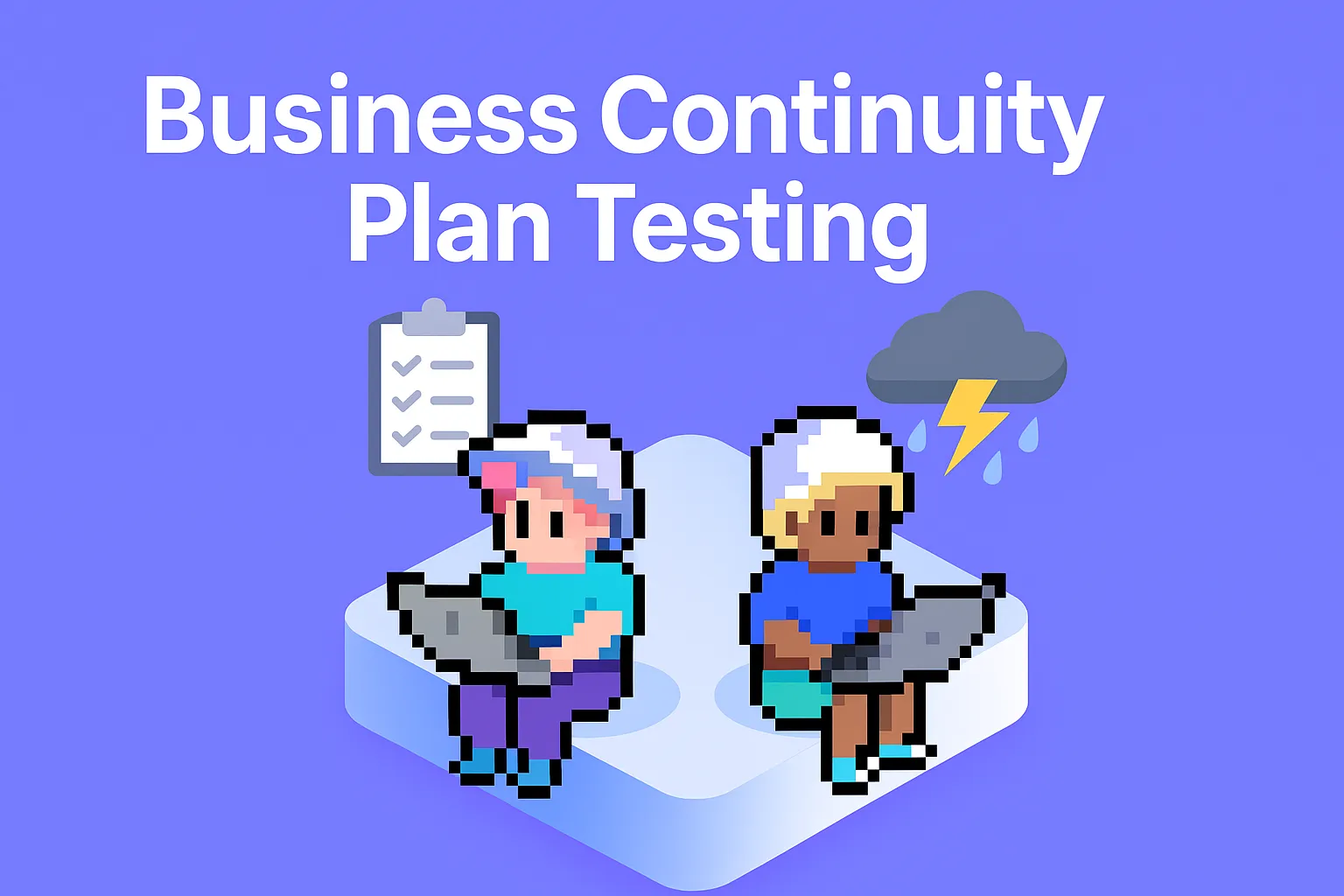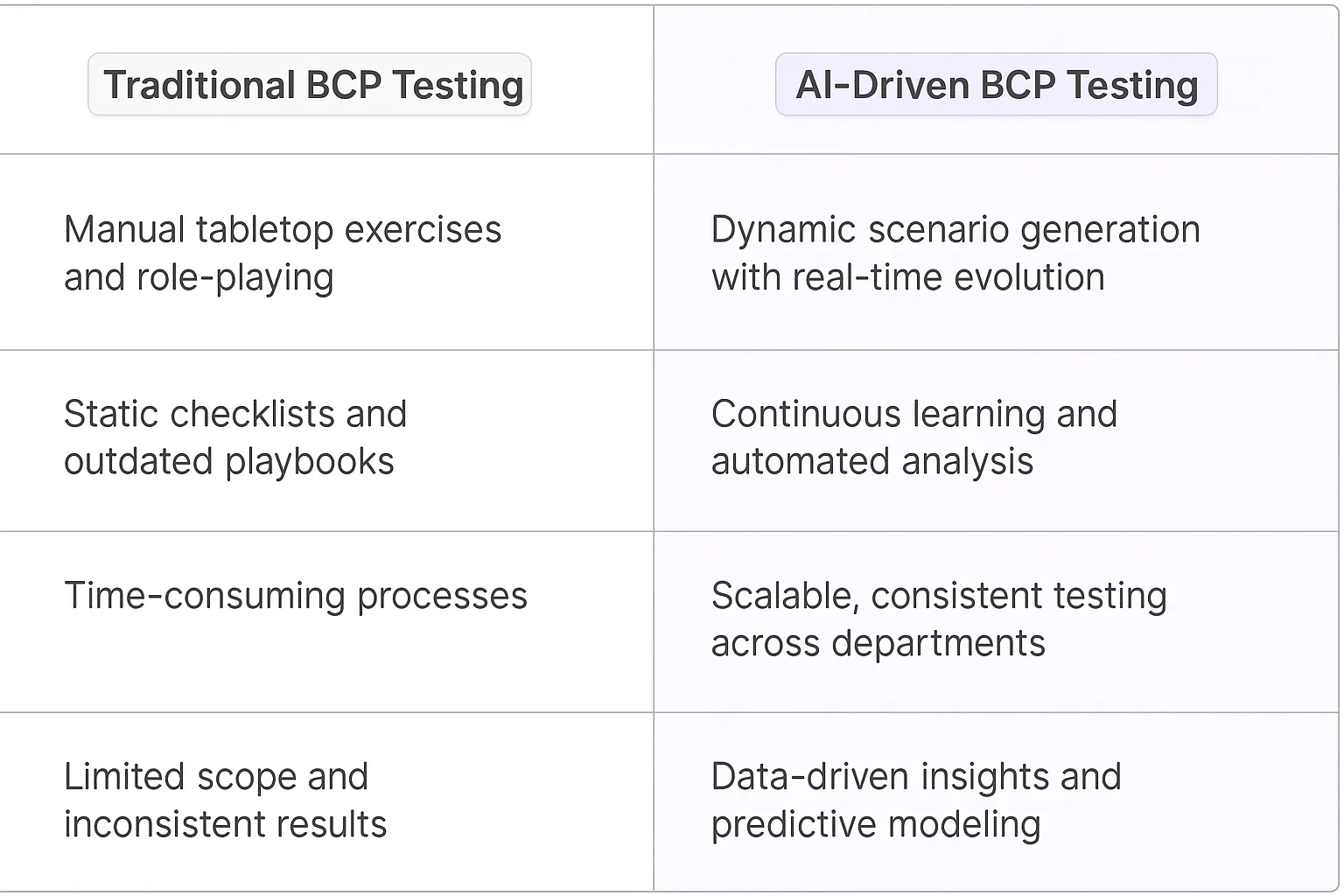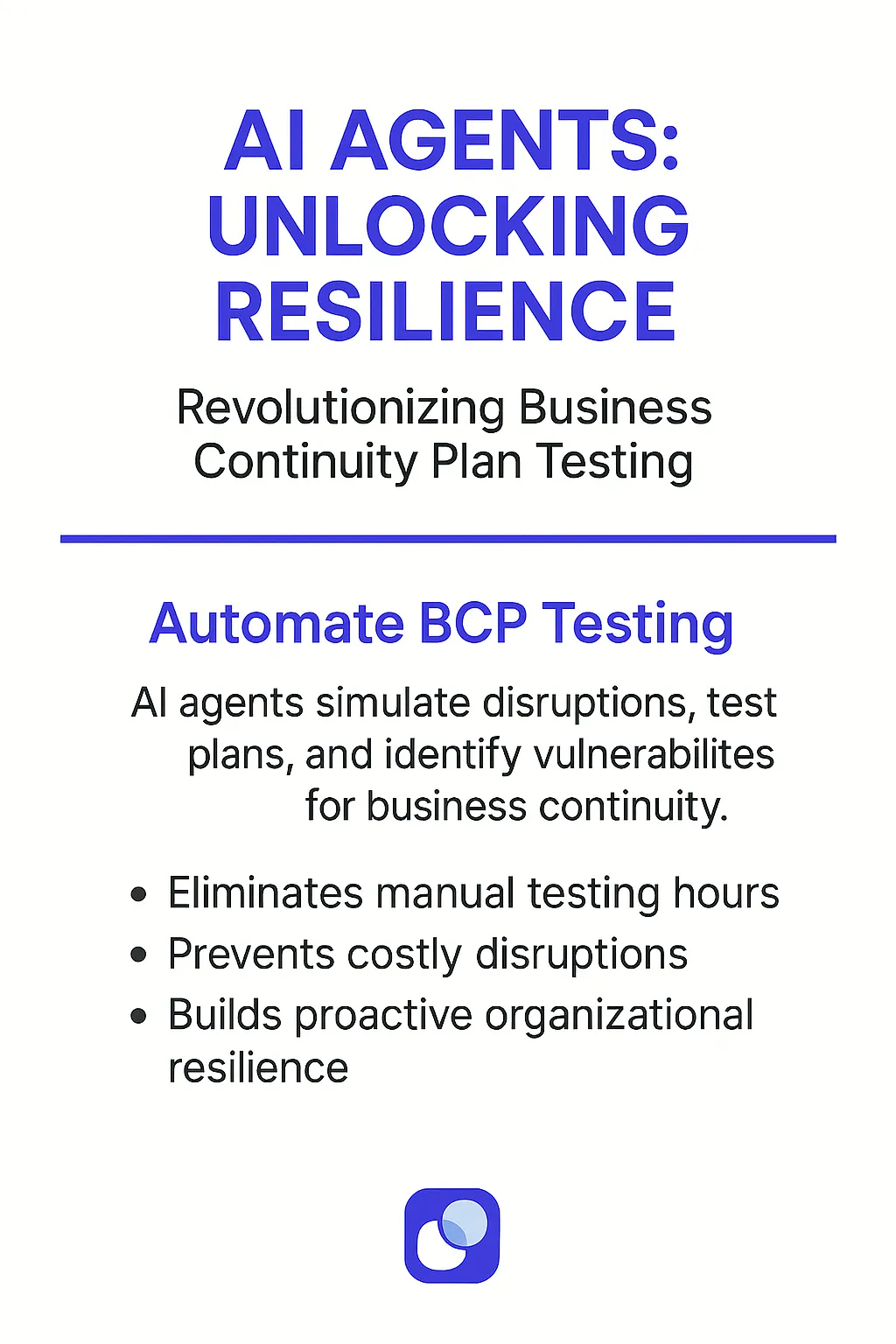Business Continuity Plan Testing AI Agents
The Evolution of Business Continuity Planning with AI
What is Business Continuity Plan Testing?
Business Continuity Plan Testing is a critical process that evaluates an organization's ability to maintain essential functions during and after a disaster or disruption. It's the practice of putting your disaster recovery plans through their paces, identifying weaknesses, and ensuring your business can bounce back from unexpected events. Traditionally, this involved manual simulations and tabletop exercises. Now, with AI agents in the mix, it's becoming a more sophisticated, data-driven endeavor.
Key Features of Business Continuity Plan Testing
1. Scenario Simulation: AI agents can generate and run complex, realistic disaster scenarios that evolve in real-time.
2. Automated Analysis: These digital teammates crunch vast amounts of data to identify vulnerabilities and improvement opportunities.
3. Continuous Learning: AI systems adapt and refine their testing approaches based on each iteration and new data inputs.
4. Cross-functional Integration: Modern BCP testing spans multiple departments and systems, providing a holistic view of organizational resilience.
5. Real-time Adaptation: During tests, AI can adjust scenarios on the fly based on the organization's responses, mimicking the unpredictability of real crises.
6. Predictive Modeling: By integrating external data sources, AI can forecast potential future disruptions and test readiness for emerging threats.
7. Performance Metrics: AI-driven testing provides detailed, actionable insights on response times, decision quality, and overall plan effectiveness.

Benefits of AI Agents for Business Continuity Plan Testing
What would have been used before AI Agents?
Before AI agents entered the scene, business continuity plan testing was a manual, time-consuming process. Companies relied on teams of employees to role-play scenarios, conduct tabletop exercises, and simulate disruptions. This approach was not only resource-intensive but also limited in scope and realism. The human element, while valuable, often introduced inconsistencies and biases that could skew test results.
Organizations would typically use static checklists, outdated playbooks, and basic software tools to manage and track their testing efforts. These methods struggled to capture the dynamic nature of modern business environments and the complex interdependencies between systems and processes.
What are the benefits of AI Agents?
AI agents are game-changers for business continuity plan testing. They bring a level of sophistication and adaptability that traditional methods simply can't match. Here's why they're so powerful:
1. Dynamic scenario generation: AI agents can create an infinite number of realistic, complex scenarios that evolve in real-time. They consider countless variables and interdependencies, pushing your continuity plans to their limits in ways human testers might never imagine.
2. Continuous learning and improvement: These digital teammates don't just run tests; they learn from each iteration. They identify patterns, weaknesses, and opportunities for improvement, constantly refining their approach and your plans.
3. Scalability and consistency: AI agents can simultaneously test multiple aspects of your continuity plan across different departments and locations. They ensure a consistent testing methodology, eliminating the variability that comes with human testers.
4. Real-time adaptation: During a test, AI agents can adjust scenarios on the fly based on the organization's responses. This mimics the unpredictable nature of real crises and forces teams to think on their feet.
5. Data-driven insights: Business Intelligence Analyst AI agents excel at crunching numbers and spotting trends. They can provide deep, actionable insights into your organization's preparedness, highlighting areas of strength and pinpointing vulnerabilities with precision.
6. Cost and time efficiency: By automating much of the testing process, AI agents free up your human talent to focus on strategic decision-making and creative problem-solving. They can run comprehensive tests in a fraction of the time it would take a human team.
7. Enhanced risk modeling: AI agents can integrate vast amounts of external data – from economic trends to weather patterns – to create more accurate and comprehensive risk models for your continuity planning.
The bottom line? AI agents are transforming business continuity plan testing from a periodic, limited exercise into a dynamic, ongoing process of improvement and readiness. They're not just testing your plans; they're helping you build organizational resilience at a fundamental level.

Potential Use Cases of AI Agents with Business Continuity Plan Testing
Processes
Business continuity plan testing is a critical process that often gets overlooked until it's too late. Enter AI agents - these digital teammates are changing the game. They're not just assistants; they're becoming integral parts of our disaster preparedness strategies.
AI agents can simulate complex disaster scenarios, stress-testing your business continuity plans in ways that were previously impossible or prohibitively expensive. They can model intricate interdependencies between different business units, predicting cascading failures that human planners might miss.
These digital teammates can also continuously monitor your organization's resilience posture, flagging potential vulnerabilities in real-time. They're like having a tireless risk analyst working 24/7, always on the lookout for new threats or changes in your business that could impact your continuity plans.
Tasks
On a more granular level, AI agents are proving invaluable for specific tasks within the business continuity testing process. They can automatically generate and update contact lists, ensuring that your emergency communication plans are always current. No more outdated phone trees or missing email addresses when disaster strikes.
These digital teammates can also help draft and refine continuity plans, drawing on vast databases of best practices and industry standards. They can suggest improvements, identify gaps, and even tailor plans to specific types of disasters or business disruptions.
During actual drills or simulations, AI agents can play the role of multiple stakeholders, providing realistic responses and challenges that test your team's readiness. They can track response times, decision quality, and overall performance, providing detailed analytics that help you refine your plans over time.
Perhaps most importantly, AI agents can help translate the lessons learned from these tests into actionable improvements. They can analyze test results, identify patterns, and suggest targeted enhancements to your continuity plans. It's like having a business continuity expert on call, constantly working to improve your organization's resilience.
The potential of AI in business continuity planning is massive. We're moving from static, rarely-updated plans to dynamic, continuously-evolving strategies that adapt in real-time to changing threats and business conditions. It's not just about being prepared for disasters anymore - it's about building organizations that are inherently resilient, capable of not just surviving but thriving in the face of disruption.

Industry Use Cases
AI agents are reshaping how organizations approach Business Continuity Plan (BCP) testing, offering a level of sophistication and efficiency that's hard to ignore. Their ability to simulate complex scenarios, analyze vast datasets, and provide real-time insights makes them indispensable across various sectors. Let's dive into some industry-specific examples that illustrate how these digital teammates are transforming BCP testing processes.
From financial institutions stress-testing their systems against cyber threats to healthcare providers ensuring uninterrupted patient care during crises, AI agents are proving their worth. They're not just tools; they're becoming integral parts of resilience strategies, helping businesses stay ahead of potential disruptions and maintain operational continuity in an increasingly unpredictable world.
Financial Services: Stress-Testing Resilience with AI
The financial sector, with its complex web of interconnected systems and global dependencies, is a prime candidate for AI-powered business continuity plan (BCP) testing. Banks, investment firms, and insurance companies can leverage these digital teammates to simulate catastrophic events and assess their readiness with unprecedented depth and accuracy.
Consider a major investment bank using an AI agent to run through thousands of disaster scenarios. The AI doesn't just follow a script; it dynamically adjusts variables based on real-world data, market conditions, and the bank's specific infrastructure. It might simulate a coordinated cyberattack hitting during a natural disaster, testing how the bank's systems handle the double whammy of physical damage and digital threats.
The AI agent can then analyze the bank's response across multiple dimensions: How quickly did critical systems failover? Were client assets adequately protected? Did communication channels remain open? By crunching vast amounts of data from past incidents and industry benchmarks, the AI provides actionable insights that human analysts might miss.
But here's where it gets really interesting: The AI doesn't stop at identifying weaknesses. It can propose and simulate remediation strategies in real-time. Maybe it suggests a new cloud-based backup system or a revised crisis communication protocol. The bank's team can then see how these changes might play out in various scenarios, allowing for rapid iteration and improvement of their BCP.
This approach transforms BCP testing from an annual checkbox exercise into a continuous improvement loop. The AI agent becomes a tireless guardian, constantly probing for vulnerabilities and suggesting enhancements. For financial institutions, where even minutes of downtime can mean millions in losses and reputational damage, this level of preparedness is a game-changer.
The ripple effects extend beyond individual institutions. As more firms adopt AI-driven BCP testing, the entire financial ecosystem becomes more resilient. Regulators gain confidence in the sector's ability to weather storms, potentially leading to more flexible oversight. And clients? They sleep better knowing their assets are protected by some of the most sophisticated risk management tools ever devised.
Manufacturing: AI-Driven Resilience in the Face of Supply Chain Chaos
Let's talk about how AI agents are reshaping business continuity planning in manufacturing. This isn't your grandfather's disaster recovery drill – we're entering an era where digital teammates can stress-test entire supply chains with the precision of a surgeon and the speed of a supercomputer.
Take a global automotive manufacturer. They're not just worried about a fire at the factory anymore. Their nightmares are filled with geopolitical tensions disrupting rare earth metal supplies, cyberattacks on just-in-time logistics systems, and sudden shifts in consumer demand rendering entire product lines obsolete.
Enter the AI-powered BCP tester. This isn't a static checklist – it's a dynamic, learning system that ingests real-time data from across the globe. It's monitoring everything from weather patterns in Southeast Asia to social media sentiment about electric vehicles in Europe.
The AI agent runs millions of simulations, each more complex than the last. What happens if a key supplier in China goes offline during peak production season? How does the supply chain reconfigure if shipping routes through the Suez Canal are blocked for a month? The AI doesn't just identify bottlenecks; it proposes solutions, learning from each iteration to build more robust contingency plans.
But here's where it gets really interesting: The AI starts to identify opportunities within the chaos. Maybe a disruption in one area reveals a more efficient routing strategy that can be applied globally. Or perhaps the stress testing uncovers excess capacity that can be monetized during normal operations.
This isn't just about avoiding disasters – it's about building antifragile systems that actually improve under stress. The manufacturers who embrace this approach aren't just surviving disruptions; they're thriving because of them.
The implications are profound. We're looking at a future where supply chains can self-heal, where production lines reconfigure on the fly, and where manufacturers can pivot entire business models in response to black swan events. It's the difference between playing defense and offense in the face of uncertainty.
For the C-suite, this is a wake-up call. The companies that invest in AI-driven BCP testing today are building moats that will be nearly impossible for competitors to cross tomorrow. It's not just about risk management anymore – it's about creating a sustainable competitive advantage in an increasingly volatile world.
Considerations for Business Continuity Plan Testing AI Agents
Technical Challenges
Implementing a Business Continuity Plan (BCP) Testing AI Agent is like trying to teach a computer to think like a disaster recovery expert. It's not just about coding; it's about encoding years of human experience into algorithms. One of the biggest technical hurdles is creating a system that can accurately simulate complex, multi-faceted disaster scenarios. We're talking about modeling everything from natural disasters to cyber attacks, and how they ripple through an organization's infrastructure.
Another technical challenge is integrating the AI agent with existing systems. Most companies have a hodgepodge of legacy software, cloud services, and custom solutions. Getting an AI to play nice with all these systems is like trying to get a cat to perform in a dog show - it's possible, but it's going to take some serious work.
Data privacy and security also present significant technical challenges. The AI agent needs access to sensitive company information to do its job effectively, but this opens up a whole can of worms when it comes to data protection regulations and cybersecurity risks. It's a delicate balance between functionality and security that requires careful consideration and robust safeguards.
Operational Challenges
On the operational side, one of the biggest hurdles is getting buy-in from all levels of the organization. Implementing an AI agent for BCP testing isn't just an IT project; it's a company-wide initiative that requires support from the C-suite down to the front-line employees. It's like trying to get everyone in a large family to agree on where to go for vacation - there's bound to be some resistance and skepticism.
Training the AI agent is another operational challenge that shouldn't be underestimated. It's not just about feeding it data; it's about teaching it to understand the nuances of your specific business operations. This requires a significant time investment from subject matter experts across different departments, who may already be stretched thin with their day-to-day responsibilities.
Finally, there's the challenge of maintaining and updating the AI agent. Business continuity plans aren't static - they evolve as the business changes, new threats emerge, and regulations update. Keeping the AI agent up-to-date with these changes is an ongoing process that requires dedicated resources and a commitment to continuous improvement. It's like trying to keep a high-performance sports car in top condition - it takes constant attention and fine-tuning to maintain peak performance.
The role of an IT Operations Manager becomes crucial in overseeing these technical and operational aspects, ensuring smooth integration and ongoing maintenance of the AI-powered BCP testing system.
The Future of Resilience: AI's Transformative Impact on Business Continuity
AI agents are fundamentally reshaping Business Continuity Plan Testing, turning it from a periodic checkbox exercise into a dynamic, ongoing process of improvement. These digital teammates are enabling organizations to stress-test their resilience in ways that were previously impossible, uncovering hidden vulnerabilities and opportunities for enhancement.
The impact goes beyond just better disaster preparedness. We're seeing a shift towards more adaptive, antifragile business models that can not only withstand disruptions but potentially thrive because of them. As AI-driven BCP testing becomes more sophisticated, it's likely to become a key differentiator in competitive markets.
However, the journey isn't without challenges. Technical hurdles around integration and data security, coupled with operational challenges like organizational buy-in and ongoing maintenance, need to be addressed. But for businesses willing to invest in this technology, the payoff in terms of resilience and strategic advantage could be enormous.
As we move forward, the line between BCP testing and overall business strategy is likely to blur. These AI systems won't just be testing disaster scenarios; they'll be providing insights that shape core business decisions. It's a brave new world of resilience planning, and AI agents are leading the charge.













